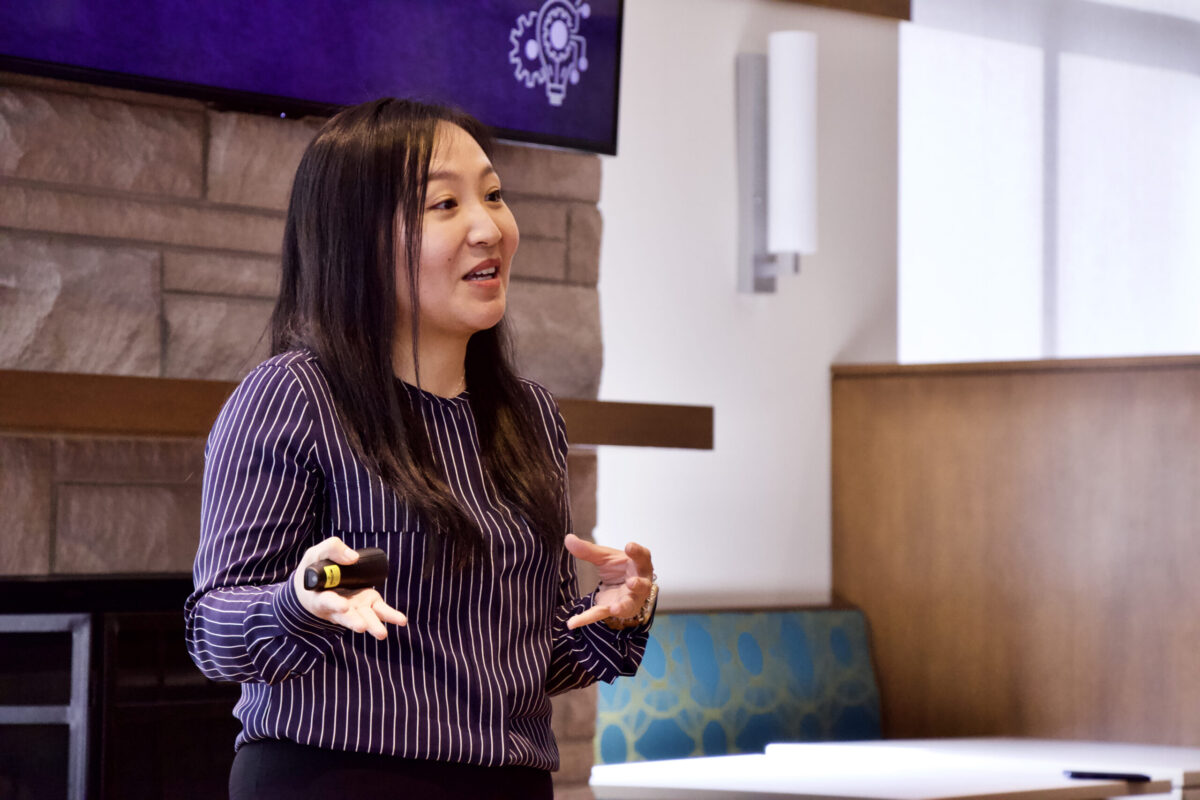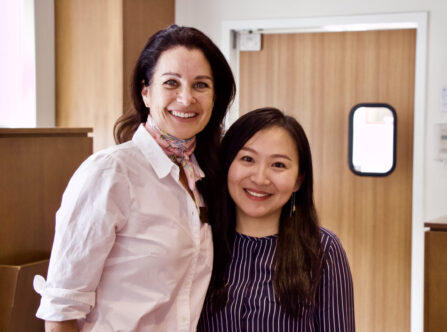Exploring consumer perceptions of human-robot service encounters
Written By: Rebecca Hoffa, rhoffa@purdue.edu

Laurie Wu speaks to the crowd at the April 21 symposium.(Tim Brouk)
Starship robots are seen throughout Purdue University’s campus daily, delivering food to hungry faculty, staff and students. They serve as an example of one of the many ways robotics and technology have been introduced to the service industry.
As the second speaker for the White Lodging-J.W. Marriott, Jr. School of Hospitality and Tourism Management (HTM) Service and Experience Symposia, Laurie Wu, associate professor of sport, tourism and hospitality management at Temple University in Philadelphia, Pennsylvania, brought her perspective on placing robots in the service industry to HTM faculty. Her discussion aligned with the symposium’s goal to provide a platform where individuals in HTM and beyond can explore different perspectives and innovative ideas within the service industries.
Wu recently published a series of research with HTM Assistant Professor Alei Fan and others to explore human-robot interactions within contemporary service encounters, and she presented their findings at the April 21 symposium.
“Digital transformation is happening — it’s here,” Wu said. “With more and more service businesses involving robots in the service frontline, we wanted to look into: What are the processes and mechanisms that we need to pay attention to when designing a service encounter with robotic involvement?”
The three studies Wu presented explore a progression of findings related to customer’s interactions with robots in service situations. The first study provided a framework for examining the role of robotics in customers’ experiences based on robot visibility, competency, performance, co-creativity and prominence balanced against typical experiential values.
The second study found that innovation tendencies play an important role in whether consumers will pay more to coproduce, or work together on, an interactive task with a robot. It indicated highly innovative customers, or customers who are receptive to new ideas, exhibit creativity, and are risk-takers and problem-solvers, are willing to pay more to coproduce with robots than they would with human employees; the opposite was true for less innovative customers, who have lower confidence and comfort with innovative products and services. Finally, the third study found having humans follow up on interactive service tasks completed by a robot can enhance customers’ satisfaction and perceptions of value with the experience.
“Her research was very insightful in showing that it’s a fine balance when integrating technology to enhance the service experience; it cannot be at the expense of that human touch,” said Ceridwyn King, HTM professor and White Lodging Services Head of the White Lodging-J.W. Marriott, Jr. School of Hospitality and Tourism Management. “I thought it was a really interesting way to show how the industry evolves, but it doesn’t necessarily mean that we forget or leave behind what has been and will always be the foundation of an exceptional hospitality experience.”

Ceridwyn King (left) and Laurie Wu (right) pose for a photo after the presentation on April 21.(Tim Brouk)
While Wu is no stranger to the innovation happening in Purdue’s College of Health and Human Sciences, having collaborations with not only Fan but also King, she noted Purdue is often recognized as the “think tank” for hospitality and tourism management, which she saw reflected in the school’s unique facilities, research, faculty and students.
“It is truly an honor of mine to be able to come here during this exciting time of innovation in the history of the White Lodging-J.W. Marriott, Jr. School of Hospitality and Tourism Management. I thoroughly enjoyed the experience of sharing and exchanging ideas with Purdue colleagues and graduate students. Potentially, that could lead to collaborations for us to work together toward our shared mission to move the industries forward,” Wu said. “Innovation is in the genes of Purdue and the White Lodging-J.W. Marriott, Jr. School of Hospitality and Tourism Management. Together with the heritage and legacy in hospitality and tourism, the school will move the field and the industry forward through leading curriculum innovations, developing cutting-edge research and cultivating leadership.”
For King, the presentation of Wu’s pioneering work offered a great way to round out the symposia series for the semester, offering a more technical keynote when compared with Jay Kandampully’s philosophical address in February. King noted the opportunity to explore both aspects is refreshing for HTM faculty.
“As researchers, we need to zoom in sometimes, but we also need to zoom out,” King said. “To me, Jay provided us the opportunity to zoom out and sort of look philosophically about how we approach certain things, whereas Laurie’s (presentation) allows us to zoom in and look at the finite pieces. It reminds us as researchers that the work that we do has multi levels.”